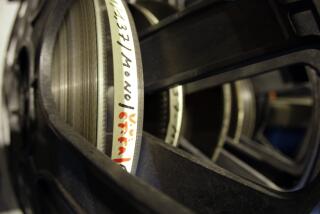Experimental Filmmaker Sonbert in UCLA Spotlight
- Share via
The UCLA Film Archive and the Independent Feature Project/West is presenting Tuesday at 8 p.m. in UCLA’s Melnitz Theater an evening of the films of veteran San Francisco experimental filmmaker Warren Sonbert, who will appear in person.
The highlight of the program is Sonbert’s infectious, vibrant 32-minute “Friendly Witness,” the title of which refers to Sonbert’s camera. A warm, lively personal yet accessible visual scrapbook, “Friendly Witness” is an inspired assemblage of bits and pieces of film shot by Sonbert over several decades.
The result is a kaleidoscopic celebration of everyday life, recording far-flung travels, sports events, the performing arts, friends, pets--Sonbert is clearly crazy about cats and circuses. Sonbert gives us the impression that he must keep his camera running all the time, not missing anything that makes people feel glad to be alive. Information: (213) 206-FILM, 206-8013.
There may never have been so absolutely raw and uncompromising a study of drug addiction than Lech Kowalski’s darkly poetic, occasionally scabrously humorous “Story of a Junkie,” originally called “Gringo” (at the New Beverly Cinema with “Drugstore Cowboy” Wednesday and Thursday only).
In 1979 Kowalski made “D.O.A.,” about Sid Vicious and the Sex Pistols, and when he met John Spacely, nicknamed “Gringo,” he realized he had found the thread for a documentary on drug addicts in New York’s Lower East Side. With Spacely, a tall, ravaged man with bleached hair and an eye patch, serving as a guide through a contemporary inferno of ruined, graffiti-covered buildings, Kowalski blurs the line between fiction and documentary with his gift for getting street people in effect to play themselves. Much of the film is devoted to the repetitive rituals of buying drugs and shooting up in largely shadowy settings, but gradually we discover that Spacely, once a clean-cut kid from Santa Monica, is a casualty of the ‘60s, an articulate, reflective man of considerable social conscience.
Drug addiction could scarcely be more deglamorized, yet Kowalski does not judge, instead taking us into world where heroin is all too clearly an escape from poverty and despair. Our parting shot of Spacely suggests that for all his enslavement to drugs he is an unexpected free spirit as he glides effortlessly through the streets of Lower Manhattan on a skateboard. Information: (213) 938-4038.
Richard Newton’s tedious “Small White House” is worth mentioning only because it inaugurates regular film presentations at Highways, Santa Monica’s dynamic performance arts center on 18th Street near Olympic Boulevard. The 79-minute feature, which Newton wrote with Joy Nicholson, seems intended to offend the sensibilities of Jesse Helms and his ilk at the expense of boring the rest of us with its kinky yet fairly coy sex and meandering plot.
Shot like a home movie (in Palm Springs and Tijuana and their environs), it centers on the aimless Johnny (Orb Kamm), Jackie (Cristina Kuta) and Mary Lynne (Heather Elias) and eventually confirms our worst fears that Newton indeed means to allude to John F. Kennedy, Jacqueline Kennedy and Marilyn Monroe and their fates. That Jacqueline Kennedy subsequently married Aristotle Onassis apparently inspired Newton to ring in Greek mythology as well, alas. Screens Saturdays at 11 p.m. through October. Information: (213) 453-3711.
Playing with a revival of the 1953 3-D movie “The Maze” (Saturday through Monday at the Vagabond)” is renowned animator Norman McLaren’s rarely seen, 10-minute award-winning “Around and Around” (1951), a vibrant experiment in 3-D involving circles and other forms. The Vagabond is screening the only surviving print in dual projector 3-D. Information: (213) 387-2171.
More to Read
The biggest entertainment stories
Get our big stories about Hollywood, film, television, music, arts, culture and more right in your inbox as soon as they publish.
You may occasionally receive promotional content from the Los Angeles Times.










